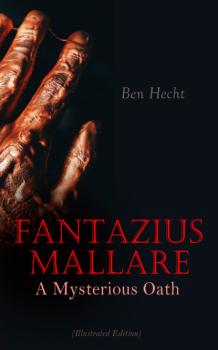Ben Hecht
Список книг автора Ben HechtFantazius Mallare
Fantazus Mallare is a tortured artist who is slowly descending into madness. In a search for a muse and aided by a dwarf-monster, Goliath, Mallare tries to make sense of the world of reason versus that of insanity. Since its publication in 1924 and being banned in 1928 by the US Government, the book has achieved a cult status that strips the veneer of sanity, religion, lust and art. Musaicum Books presents to you the meticulously edited book with all the original black and white illustrations which earned it both its notoriety and praise. Excerpt: "FantaziusMallare considered himself mad because he was unable to behold in the meaningless gesturings of time, space and evolution a dramatic little pantomime adroitly centered about the routine of his existence. He was a silent looking man with black hair and an aquiline nose. His eyes were lifeless because they paid no homage to the world outside him. When he was thirty-five years old he lived alone high above a busy part of the town. He was a recluse. His black hair that fell in a slant across his forehead and the rigidity of his eyes gave him the appearance of a somnambulist. Twenty-twoHe found life unnecessary and submitted to it without curiosity. His ideas were profoundly simple. The excitement of his neighborhood, his city, his country and his world left him unmoved. He found no diversion in interpreting them. A friend had once asked him what he thought of democracy. This was during a great war being waged in its behalf. Mallare replied: «Democracy is the honeymoon of stupidity.»
Gargoyles
"Gargoyles" by Ben Hecht. Published by Good Press. Good Press publishes a wide range of titles that encompasses every genre. From well-known classics & literary fiction and non-fiction to forgotten−or yet undiscovered gems−of world literature, we issue the books that need to be read. Each Good Press edition has been meticulously edited and formatted to boost readability for all e-readers and devices. Our goal is to produce eBooks that are user-friendly and accessible to everyone in a high-quality digital format.
Erik Dorn
"Erik Dorn" by Ben Hecht. Published by Good Press. Good Press publishes a wide range of titles that encompasses every genre. From well-known classics & literary fiction and non-fiction to forgotten−or yet undiscovered gems−of world literature, we issue the books that need to be read. Each Good Press edition has been meticulously edited and formatted to boost readability for all e-readers and devices. Our goal is to produce eBooks that are user-friendly and accessible to everyone in a high-quality digital format.
1001 Afternoons in Chicago
1001 Afternoons in Chicago were launched in June, 1921. They were presented to the public as journalism extraordinary; journalism that invaded the realm of literature, where in large part, journalism really dwells. They went out backed by confidence in the genius of Ben Hecht. The sketches themselves reveal Hecht's literary powers and creative delight in them; they ring with the happiness of a spirit at last free to tell what it feels; they teem with thought and impressions long treasured; they are a recital of songs echoing the voices of Ben's own city and performed with a virtuosity granted to him alone. They announced to a Chicago audience which only half understood them, the arrival of a prodigy whose precise significance is still unmeasured.
Fantazius Mallare: A Mysterious Oath (Illustrated Edition)
FantazusMallare is a tortured artist who is slowly descending into madness. In a search for a muse and aided by a dwarf-monster, Goliath, Mallare tries to make sense of the world of reason versus that of insanity. Since its publication in 1924 and being banned in 1928 by the US Government, the book has achieved a cult status that strips the veneer of sanity, religion, lust and art. e-artnow presents to you the meticulously edited book with all the original black and white illustrations which earned it both its notoriety and praise. Excerpt: "FantaziusMallare considered himself mad because he was unable to behold in the meaningless gesturings of time, space and evolution a dramatic little pantomime adroitly centered about the routine of his existence. He was a silent looking man with black hair and an aquiline nose. His eyes were lifeless because they paid no homage to the world outside him. When he was thirty-five years old he lived alone high above a busy part of the town. He was a recluse. His black hair that fell in a slant across his forehead and the rigidity of his eyes gave him the appearance of a somnambulist. Twenty-twoHe found life unnecessary and submitted to it without curiosity. His ideas were profoundly simple. The excitement of his neighborhood, his city, his country and his world left him unmoved. He found no diversion in interpreting them. A friend had once asked him what he thought of democracy. This was during a great war being waged in its behalf. Mallare replied: «Democracy is the honeymoon of stupidity.»
A Thousand and One Afternoons in Chicago
"A Thousand and One Afternoons in Chicago" by Ben Hecht. Published by Good Press. Good Press publishes a wide range of titles that encompasses every genre. From well-known classics & literary fiction and non-fiction to forgotten−or yet undiscovered gems−of world literature, we issue the books that need to be read. Each Good Press edition has been meticulously edited and formatted to boost readability for all e-readers and devices. Our goal is to produce eBooks that are user-friendly and accessible to everyone in a high-quality digital format.
The Florentine Dagger
This Golden Age mystery novel features a nervous cavalier with frightened eyes, a mysterious and puritanical satyr, a dagger, a candlestick, a crucifix, and a false beard—and, of course, a detective! (Not to mention the protagonist, «Prince Julien de Medici – of Broadway.») Adapted into the movie of the same name in 1935.






